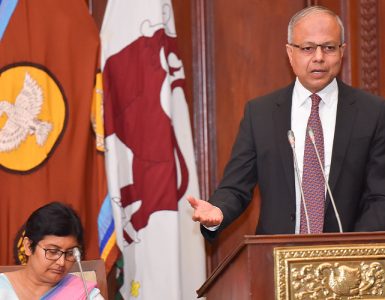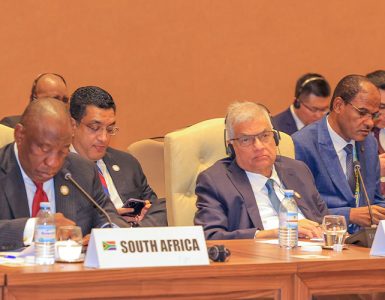- President says Inaugurating the Kandy Branch of Sri Lanka Institute of Information Technology (SLIIT).
President Ranil Wickremesinghe emphasized that Sri Lanka’s path to economic prosperity hinges on its geographical location and its human resources. He also highlighted the successes of countries like Singapore and Hong Kong, which have flourished by harnessing their workforce effectively. These remarks were made during his attendance at the inauguration of the Sri Lanka Institute of Information Technology (SLIIT) Kandy branch yesterday (09).
The seven-storey private university boasts state-of-the-art facilities, including laboratories, conference halls, research labs and accommodation. Following the unveiling of the commemorative plaque, the President inaugurated the university and conducted an on-site tour, engaging with students to learn about their educational endeavours.
In addition, President Ranil Wickremesinghe underscored the importance of steering Sri Lanka towards a rapidly expanding, highly competitive, technology-driven economy, a digital economy and a sustainable green economy as future initiatives. He also outlined plans to modernize the country’s university system, with the establishment of new public and private universities to produce graduates with the requisite technical expertise.
Expressing his views further, President Wickremesinghe said;
We find ourselves amidst a global technological revolution, with a significant portion of this revolution driven by Western nations. However, developing countries hold a smaller share, and the absence of China would further reduce this portion.
In 1977, we embarked on a journey to shape our nation’s future through the garment industry. Today, it is imperative to expand and strengthen this industry. Our future lies in the development of technology-based industrial, agricultural and service systems. We must diligently work towards this objective.
Following the conclusion of the credit optimization program, the government’s vision for the future will be unveiled. Our primary goals include the establishment of a rapidly growing, highly competitive technology-driven economy, the creation of a digital-based economic framework and the promotion of a sustainable green economy.
It’s noteworthy that Sri Lanka has already embarked on green economy initiatives and has made significant strides in this regard. To facilitate the success of these programs, we must overhaul our education system and foster knowledge acquisition. This entails modernizing existing universities and launching new ones to meet the demands of our evolving landscape.
There are plans in motion to establish these universities through a collaborative effort between the government and the private sector. A key focus has been placed on reinvesting profits into these universities and the possibility of profit-sharing universities is being explored. Additionally, we have designed a program to offer subsidized interest rate loans to students pursuing their degrees in these universities.
It’s worth noting that there are on-going initiatives to launch multiple universities and a medical faculty within the non-government sector. The government also has intentions to initiate new universities in various regions, including Kurunegala, Sitawaka and others, each with at least two campuses. These plans are slated for preparation and completion within the current year.
In the process of implementing these initiatives, special attention has been given to Kandy. The University of Ceylon, which once held the distinction of being Asia’s top university, played a pivotal role in advancing the country’s independence during its early decades. Hence, there is a commitment to rejuvenate and develop this institution.
Additionally, discussions have been held regarding the establishment of an IIT Chennai campus in Kandy, with the possibility of it evolving into a standalone university. Plans are also in place for the creation of the International University of Climate Change in the Kothmale area and deliberations are on-going regarding another university in the Polgolla area. These endeavours are set to transform Kandy into a technology hub.
Furthermore, the plan includes the establishment of vocational colleges in place of vocational training centres, recognizing the need for skilled personnel across various sectors, not just graduates. In Sri Lanka, our economic uniqueness stems from our geographical location and human resources. We aim to progress, much like Singapore and Hong Kong, by harnessing the potential of our human capital.
Our vision is to advance towards a green economy, a digital economy and a technology-driven economy, all of which necessitate a robust institutional framework. This endeavour is a collective effort and I extend my gratitude to all those who have contributed to these endeavours today.
When we observe the remarkable talents displayed by these students, it becomes evident that our country holds the potential for a bright future. This prowess is not limited to this institution alone; science students hailing from engineering technology institutes such as Moratuwa, Peradeniya and Jaffna have also demonstrated exceptional abilities. It is imperative that we nurture and advance with these talents.
In doing so, we have the opportunity to transform the historically significant Kandy area into a burgeoning technology hub. Concurrently, discussions are underway regarding the development of the tourism industry centred around Kandy. I must emphasize that new technology will breathe fresh life into this historic city, once the capital of our nation and a crucial cultural centre.”
The event was graced by the presence of several dignitaries, including Presidential Senior Adviser on National Security and Chief of Presidential Staff Mr. Sagala Ratnayake, Central Province Governor Mr. Lalith U Gamage, Minister of State for Health Ms. Sita Arambepola, Members of Parliament Mr. Vajira Abeywardena, Dr. Rajitha Senaratne, Mr. Rauf Hakeem, former Ministers Mr. Malik Samarawickrama, Dr. Sarath Amunugama, as well as SLIIT University’s Chancellor and Chairman Prof. Lakshman Ratnayake, Vice Chancellor Prof. Lalith Gamage and the esteemed teaching staff of the university.





